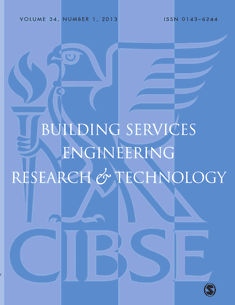
Building Services Engineering Research & Technology
Scope & Guideline
Advancing Sustainable Solutions in Building Services Engineering
Introduction
Aims and Scopes
- Energy Efficiency and Sustainability:
Research dedicated to improving energy efficiency in buildings, with a strong emphasis on sustainable practices and technologies, including renewable energy integration and energy retrofitting. - HVAC Systems Optimization:
Focuses on optimizing heating, ventilation, and air conditioning (HVAC) systems through advanced modeling, control strategies, and new technologies to enhance performance and indoor air quality. - Thermal Comfort and Indoor Environment:
Investigates various aspects of thermal comfort, indoor air quality, and occupancy behavior to ensure healthy and comfortable environments in residential and commercial spaces. - Fire Safety Engineering:
Explores innovative fire safety solutions, including smoke control systems and evacuation strategies, particularly in complex building designs and urban environments. - Computational Simulations and Modeling:
Utilizes computational fluid dynamics (CFD) and other simulation techniques to assess and predict building performance under various conditions, enhancing design and operational efficiencies. - Digital Technologies and Smart Buildings:
Examines the role of digital twins, IoT, and data-driven methodologies in building management systems to improve operational efficiency and energy management.
Trending and Emerging
- Net Zero and Whole Life Carbon Assessment:
A significant trend is the focus on achieving net-zero emissions in building design and operation, with comprehensive evaluations of whole life carbon impacts becoming a central theme. - Machine Learning and Predictive Control:
Emerging interest in machine learning applications for predictive control of building systems, enhancing energy efficiency and operational performance. - Hybrid and Integrated Systems:
Research is increasingly exploring hybrid systems that combine different technologies (e.g., radiant cooling with fresh air systems) to optimize performance and energy use. - Resilience Against Climate Change:
Studies addressing building resilience against climate change impacts, such as extreme weather events and temperature fluctuations, are gaining traction. - Smart City Applications:
There is a growing emphasis on integrating building services within smart city frameworks, utilizing data-driven approaches to improve urban living conditions. - Advanced Ventilation Strategies:
Innovative ventilation techniques, including hybrid and natural ventilation approaches, are emerging as critical topics in response to indoor air quality concerns, particularly post-COVID-19.
Declining or Waning
- Traditional HVAC Control Systems:
There is a noticeable reduction in research focused on conventional HVAC control systems as newer, more efficient technologies and smart control methodologies gain prominence. - Basic Energy Efficiency Measures:
Basic energy efficiency measures are becoming less of a focus, with more complex and integrated solutions being preferred in recent studies. - General Building Codes and Regulations:
Research centered on general building codes and regulations appears to be waning, possibly due to the increasing emphasis on innovative and flexible approaches to building performance. - Static Fire Safety Measures:
The focus on static fire safety measures is declining, as more dynamic and integrated approaches to fire safety and risk management are being explored.
Similar Journals
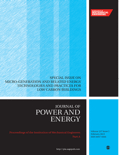
PROCEEDINGS OF THE INSTITUTION OF MECHANICAL ENGINEERS PART A-JOURNAL OF POWER AND ENERGY
Exploring the Frontiers of Mechanical EngineeringPROCEEDINGS OF THE INSTITUTION OF MECHANICAL ENGINEERS PART A-JOURNAL OF POWER AND ENERGY, published by SAGE PUBLICATIONS LTD, is a pivotal journal dedicated to advancing the fields of mechanical engineering and energy technology. With a history spanning from 1983 to 2024, this journal provides a respected platform for researchers and practitioners to disseminate findings that address contemporary challenges in power generation, energy efficiency, and sustainable engineering practices. As evidenced by its quarter ranking in Q3 within the categories of Energy Engineering and Power Technology, and Mechanical Engineering, it serves as a significant resource for academics aiming to enhance their understanding and explore innovation in these critical areas. While currently not an open-access journal, the research published here is invaluable for both ongoing education and professional practice, making it an essential read for anyone engaged in the engineering disciplines.
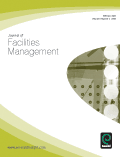
Journal of Facilities Management
Advancing Interdisciplinary Solutions for Facilities Management ChallengesThe Journal of Facilities Management, published by Emerald Group Publishing Ltd, is a premier scholarly platform dedicated to the evolving field of facilities management. With an ISSN of 1472-5967 and an E-ISSN of 1741-0983, this journal has established itself as a crucial resource for researchers, practitioners, and students alike since its inception. Operating within a robust academic framework, the journal holds a commendable Q2 ranking in various pertinent categories including Business and International Management, Management of Technology and Innovation, and Strategy and Management, reflecting its impact and relevance in these domains. The journal invites high-quality, interdisciplinary research that addresses the complexities of facilities management, providing insights and practical solutions that benefit organizations worldwide. Although not open access, the Journal is committed to maintaining academic rigor and accessible knowledge dissemination through its articles, which are meticulously reviewed by experts in the field. As it continues to evolve through its converged publication years of 2002 to 2003 and 2005 to 2024, the Journal of Facilities Management stands out as an essential resource for those seeking to enhance their understanding and practice of effective facilities management.
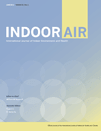
INDOOR AIR
Unlocking Insights for Healthier Indoor Air.INDOOR AIR is a leading peer-reviewed journal published by WILEY-HINDAWI, focusing on the critical field of indoor environmental quality and its impact on public health. Since its inception in 1991, this esteemed journal has been at the forefront of research in Building and Construction, Environmental Engineering, and Public Health. With a commendable Q1 ranking across these categories in 2023, INDOOR AIR has established itself as a pivotal resource for scholars and industry professionals alike, as evidenced by its impressive Scopus rankings—35th in Public Health, 14th in Building and Construction, and 20th in Environmental Engineering. The journal is dedicated to disseminating groundbreaking research, reviews, and case studies that advance knowledge and methodologies in improving indoor air quality and its implications for health outcomes. Aspiring to maintain open access to vital scientific discourse, INDOOR AIR invites contributions that foster interdisciplinary collaboration and innovation in understanding indoor environments. Based in Denmark, the journal continues to engage a global audience committed to enhancing health and well-being through improved indoor air quality.
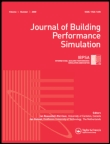
Journal of Building Performance Simulation
Elevating Architecture Through Advanced Simulation TechniquesJournal of Building Performance Simulation, published by Taylor & Francis Ltd, is a premier academic journal dedicated to advancing the fields of architecture, building and construction, and computational modeling. With an ISSN of 1940-1493 and an E-ISSN of 1940-1507, this journal is recognized for its high-quality, peer-reviewed research, reflected in its impressive Q1 ranking in both Architecture and Building and Construction categories for 2023. Spread over a notable converged publishing timeline from 2008 to 2024, it aims to address contemporary issues in building performance and simulation methodologies, serving both practitioners and academics alike. Positioned within the 92nd percentile in Engineering - Architecture, the journal is a vital resource for professionals focused on innovative design and simulation technologies that enhance building efficiency and sustainability. Despite its robust reputation, the journal currently does not offer open-access options, which underscores its commitment to maintaining academic rigor. Engage with cutting-edge research that drives the future of building performance through this influential journal.

Building Simulation
Empowering Sustainable Design Through SimulationBuilding Simulation is a leading academic journal published by TSINGHUA UNIVERSITY PRESS, focusing on the critical intersection of building and construction and energy efficiency. With its ISSN 1996-3599 and E-ISSN 1996-8744, this journal stands out in the Q1 category for both Building and Construction and Energy (miscellaneous), as recognized in the latest 2023 category quartiles. It has established itself as an influential platform for disseminating innovative research and developments in building performance simulation and energy use optimization, boasting impressive Scopus rankings at Rank #15/223 in Engineering (Building and Construction) and Rank #15/78 in Energy (miscellaneous), placing it in the upper percentiles of its field. Since its inception in 2008, the journal has fostered a rich dialogue among practitioners, researchers, and students, empowering them to advance sustainable building practices and contribute to global energy conservation efforts. Building Simulation is an open-access journal, making its valuable content accessible to a worldwide audience, further enhancing its role as a vital resource in the quest for innovative building solutions.

IEEE Electrification Magazine
Transforming Ideas into Electrifying SolutionsIEEE Electrification Magazine, published by the Institute of Electrical and Electronics Engineers (IEEE), serves as a pivotal platform in the field of Electrical and Electronic Engineering. With an ISSN of 2325-5897 and an E-ISSN of 2325-5889, this esteemed journal aims to bridge the gap between research and practical applications in electrification, addressing current trends and technological advancements since its inception in 2013. Notably recognized as a Q1 journal in Electrical and Electronic Engineering and a Q2 journal in Energy Engineering and Power Technology for 2023, it ranks in the 72nd and 69th percentiles, respectively, within its categories according to Scopus. As a vital resource for researchers, professionals, and students, it delivers thought-provoking articles that stimulate discourse and innovation within the electrification landscape, though it currently does not offer open access. The editorial excellence and rigorous peer-review process ensure that each published piece contributes meaningfully to the dynamic field of electrification, solidifying the journal’s importance as a leading voice in advancing engineering practices and education.

Journal of Green Building
Innovating Building Technologies for Environmental ExcellenceJournal of Green Building, with its ISSNs 1552-6100 and 1943-4618, is a premier academic journal published by COLLEGE PUBLISHING in the United States. This journal, established in 2006 and continuing through 2024, serves as a vital platform for the dissemination of research on sustainable architecture, building technologies, and environmental design. With its current impact factor signifying a robust academic contribution, it is categorized in Q2 in Architecture and Q3 across several other disciplines, including Building and Construction, Environmental Engineering, and Public Health. The journal’s Scopus rankings demonstrate its strong positioning in the engineering and environmental science communities, making it an essential resource for researchers and professionals aiming to advance knowledge in green building practices. While it is not an Open Access journal, the rich content is pivotal for those involved in the critical intersection of sustainability and construction science. Whether you are a seasoned professional or a dedicated student, the Journal of Green Building offers invaluable insights that drive future innovations in eco-friendly building environments.
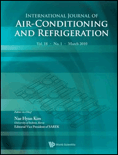
International Journal of Air-Conditioning and Refrigeration
Elevating Standards in Air-Conditioning and Refrigeration ScienceInternational Journal of Air-Conditioning and Refrigeration is a leading peer-reviewed journal published by SpringerNature, focusing on pioneering research in the fields of air-conditioning and refrigeration technologies. With an Open Access model adopted since 2022, the journal ensures that high-quality research is freely accessible to a broad audience, facilitating knowledge dissemination and innovation. The journal covers a diverse range of topics, including control systems, fluid flow, and renewable energy applications, making it relevant for professionals and researchers within the disciplines of Control and Systems Engineering, Fluid Flow and Transfer Processes, and Renewable Energy. Positioned in the Q3 quartile across multiple categories as of 2023, it offers a valuable platform for emerging trends and sustainable practices in the industry. The Scopus rankings reflect its commitment to scholarly excellence, highlighting its role as an essential resource for those engaged in the development and implementation of innovative air-conditioning and refrigeration systems.

Engineering Reports
Advancing engineering frontiers through innovative research.Engineering Reports is a premier open-access journal published by Wiley, dedicated to advancing the fields of Engineering and Computer Science. Since its inception in 2019, this journal has rapidly gained recognition, achieving a commendable Q2 ranking in both the engineering and computer science categories in 2023, evidencing its impactful contributions to the scientific community. With an impressive Scopus rank of #70/307 in General Engineering and #63/232 in General Computer Science, the journal is well-positioned to disseminate cutting-edge research and foster innovation. Researchers, professionals, and students will find value in its comprehensive scope, which includes emerging technologies and interdisciplinary studies, making it an essential resource for anyone involved in these dynamic fields. Accessible online, Engineering Reports aims to bridge the gap between complex engineering theories and practical applications, enhancing collaboration and knowledge sharing globally.

International Journal of Ventilation
Elevating Standards in Ventilation ResearchThe International Journal of Ventilation, published by Taylor & Francis Ltd, serves as a critical platform for the dissemination of innovative research in the fields of building and construction, civil and structural engineering, control and systems engineering, and electrical and electronic engineering. With an ISSN of 1473-3315 and an e-ISSN of 2044-4044, this esteemed journal has maintained a significant presence since its inception in 2005 and continues to provide valuable insights for academics and professionals alike until 2024. Recognized in the 2023 rankings, it holds a Q2 designation in Building and Construction and Q3 status in several other engineering categories, reflecting its solid standing in the academic community. Despite its non-open access format, the journal remains a vital resource, focusing on advanced ventilation solutions that shape sustainable practices in building design and engineering systems. By publishing high-quality peer-reviewed articles, the International Journal of Ventilation plays a pivotal role in advancing knowledge, fostering collaboration, and inspiring future research within its dynamic fields of study.